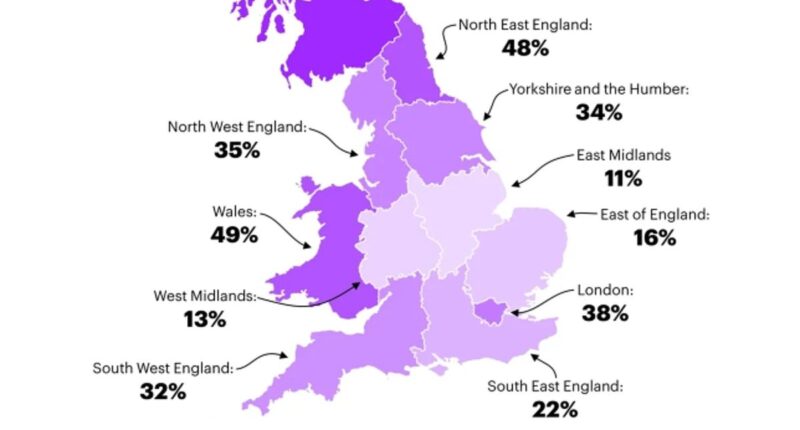A recent poll has unveiled that a majority of Londoners do not feel a strong connection to the rest of England. Instead, they emphasize the unique characteristics of the capital such as its diversity and multiculturalism.
According to the findings, only 29% of London residents express a significant attachment to the country as a whole, while 38% feel a stronger bond with their city. The survey, conducted by YouGov, highlights this disparity in sentiment.
The research aimed to explore regional identities within the UK and discovered that 30% of London’s population views the city’s diversity and multicultural makeup as its standout features.
And, while one in nine (11 per cent) indicated that its famous historical attractions were what made the city so unique, a mere eight per cent of participants argued that it was the London Underground, the oldest underground railway network worldwide.
The results come amid increased debate surrounding the impact of mass migration on identity within the UK, with Prime Minister Sir Keir Starmer recently stating that Britain was at risk of becoming an ‘island of strangers’ without stricter rules on migration.
The PM was forced to stand by his remark after he was accused of using language similar to Enoch Powell’s notorious 1968 ‘Rivers of Blood’ speech. Mr Powell had said the native British population had ‘found themselves made strangers in their own country’ because of mass immigration.
Downing Street said there was no comparison between the phrases.

Only an estimated 29 per cent of those living in London feel a ‘very strong attachment’ to the country, compared with 38 per cent who said they held a stronger affinity towards the city

Those in the North East were shown to have the highest proportion (48 per cent) of individuals who felt a ‘very strong’ attachment to their region. Meanwhile, in the East Midlands, a mere 11 per cent of participants noted feeling attached to the area

Indicating varying regional and national identities, the new findings have shown that people were more likely to express a strong attachment to England than their particular region in the East Midlands, West Midlands, East of England and South-East of England
A separate poll by YouGov found 53 per cent of people agreed with the PM’s sentiment and half thought his language was ‘acceptable’. The survey also found there was little confidence that the Government will reduce immigration levels.
Now, indicating varying regional and national identities, the new findings have shown that people were more likely to express a strong attachment to England than their particular region in the East Midlands, West Midlands, East of England and South-East of England.
Alongside the high figures reported in London, those in the North East were shown to have the highest proportion (48 per cent) of individuals who felt a ‘very strong’ attachment to their region.
When asked what makes their area so unique, those surveyed provided an array of varying answers.
One in five in the North East (20 per cent) and North West (19 per cent) believed that friendliness or a sense of human were the most distinguishing characteristic, while others praised the area’s natural scenery.
For Southerners, however, marine features were seen to be the most prominent, with 24 per cent of those living in the South West indicating that the region’s beaches, coast or sea were the most noteworthy.
For others, natural features, such as countryside or scenery, were what made the area stand out, ranking as the most distinctive thing about the area for 36 per cent from Yorkshire and the Humber, 34 per cent of Scots, and 30 per cent of those living in Wales.

Indicating a strong sense of regional identity, the majority of Brits surveyed believed that their region was the most superior place to live across the UK, with more than 80 per cent of those in the South West arguing that their area was ‘a lot better’ than elsewhere

When asked what makes their area so unique, participants provided an array of varying answers ranging from natural beauty, friendliness of residents and marine features. However, many struggled to give an answer at all – with 6 per cent in London, the North East of England and the South West believing there was nothing distinctive about their region

The results come amid increased debate surrounding the impact of mass migration on identity within the UK, with Prime Minister Sir Keir Starmer (pictured) recently stating that Britain was at risk of becoming an ‘island of strangers’ without stricter rules on migration
However, many struggled to give an answer when asked what the most distinctive part of their region was – with 6 per cent in London, the North East of England and the South West believing there was nothing distinctive about their region.
Indicating a strong sense of regional identity, the majority of Brits surveyed believed that their region was the most superior place to live across the UK, with more than 80 per cent of those in the South West arguing that their area was ‘a lot better’ than elsewhere.
This confidence was echoed in Scotland, at 33 per cent, while only a respective seven per cent in the East and West Midlands believed their region was the best place to live.
In London, satisfaction rates were also seen to be in decline, with nearly a third admitting that they believed the city was the worst place to live in the UK by either ‘a little’ or ‘a lot’.
The data comes after shadow justice secretary Robert Jenrick told The Mail in September last year that he believed mass immigration and woke culture were putting England’s national identity at risk.
Mr Jenrick, former minister for immigration, said that he feared the ties which bind the nation were beginning to ‘fray’ due to an influx of migrants, alongside a negative attitude of the ‘metropolitan establishment’ towards English identity.

















